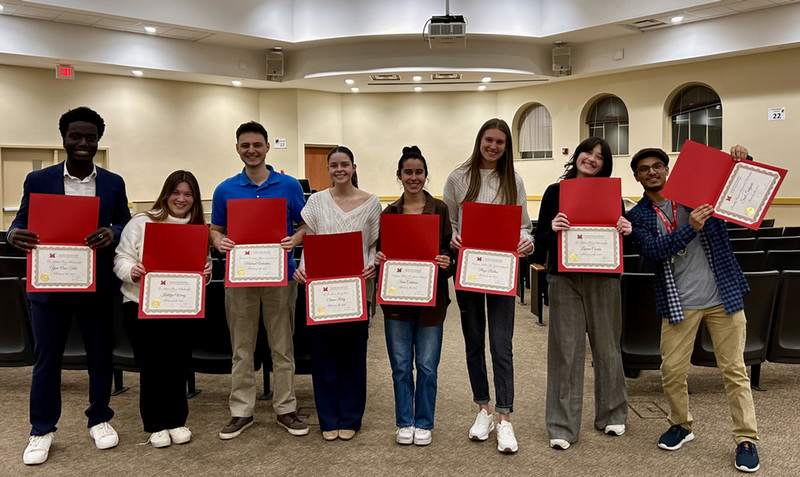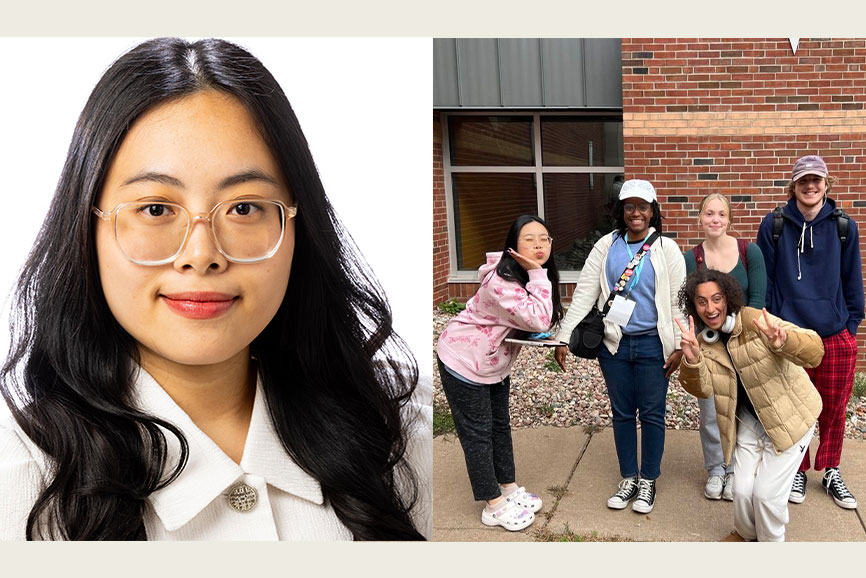

Spanish and Portuguese
We are dedicated to helping students form strong oral and written communication skills in both Spanish and Portuguese — and to developing students' capacity for critical thinking and cultural literacy. Our department offers a rich undergraduate program that allows for the study of the literature, language, and cultures of the Hispanic and Lusophone worlds from a broad range of perspectives: film studies, gender studies, creative writing, history, and more. A variety of opportunities are available to students outside of the classroom as well, such as study abroad programs, faculty-led workshops in Latin America, and service learning initiatives in the surrounding Hispanic communities. We also offer a combined BA/MA program. Whether in the classroom, in a one-on-one- collaboration with the faculty, or in the larger community, our students develop the practical skills and cultural preparedness they need for their future as citizens and professionals in a world in which Hispanic/Latino cultures play an increasingly important role. ¡Bienvenidos! Bem-Vindos!
Our Programs
The Department offers a major, a minor, and a combined BA/MA program in Spanish, as well as specialized modified Spanish courses for the Basic Language Sequence (SPN 101, 102, 201, and 202) for students who have diagnosed learning disabilities and for students who have demonstrated a significant difficulty in learning a foreign language. The department offers accelerated Portuguese courses that can meet a year's worth of language requirement in one semester. Outstanding students in Spanish are invited by the faculty to participate in our departmental honors program. We offer a wide range of courses, from introductory language classes to MA-level seminars. Students should check the course listings regularly since offerings rotate and faculty frequently update their content.


Portuguese
Congratulations to our 2025 Scholarship Winners

Congratulations to our Spanish Department scholarship and award winners for this academic year! The annual scholarship dinner was held on Wednesday, February 5th, 2025. Students received awards from the L.P. Irvin Essay Prize, the Dr. Glenn Barr Scholarship, the Willis K. Jones Award, the Robert Newman Memorial Award, the Timothy Rogers Memorial Scholarship, and the Washington R. Vazquez Scholarship.
Pictured: Yaw Osei-Tutu, Katelyn Wang, Michael Valentino, Eliana Riley, Sara Calderon, Paige Bolton, Lauren Combs, and Saul Salgado
Not Pictured: Catherine Werthmann, Jacey Cassandra, Leah Steinbrecher, Hannah Alvarez, Jaden McDonald, and Sydney Watson.
Meet Our Students

Spanish and Portuguese • Microbiology • Mallory Wilson Center for Healthcare Education

Spanish and Portuguese • Global and Intercultural Studies

Spanish and Portuguese • Mallory Wilson Center for Healthcare Education • Chemistry and Biochemistry
Our Resources for Students

Immerse Yourself and Study Abroad
The Department offers an array of study abroad programs in Spanish-speaking countries. Workshops and Education Abroad programs in Winter and Summer Terms are run by Miami faculty in Spain and Latin America.
For example, with the Miami in Spain program, students experience Spanish culture from different perspectives. The program offers courses on Spanish language, literature, and linguistics courses taught by Miami faculty in Gijón, where students live with host families. Additionally students learn about Spanish culture through a Culinary Trip around Spain. Miami students have the opportunity to examine cinema and literature while taking conversation and composition courses in Spain or to study Medical Spanish while working with local doctors in Costa Rica. Miami also sponsors study abroad programs for the intermediate language learner which take place in different locations throughout Argentina.

Discover Our Resources for Your Time at Miami and Beyond
We don't just work with students in the day-to-day academic world, but we prepare them for their future. Students can pursue an internship with a non-profit or business that allows them to enhance their critical thinking, research skills and communication abilities as well as further develop their knowledge of the career paths of Spanish graduates. Students will also enhance their Spanish-language skills and further develop their knowledge of Hispanic/Latino communities.
While at Miami, students can take advantage of our specialized academic advising office, get extra help in our Spanish & Portuguese Open Tutoring office, and partake in all sorts of student groups and extra-curricular activities, such as the Spanish Language Table.
Learn about our department scholarships and how they can help you with a study abroad program!
Give to the Department of Spanish and Portuguese
Help us prepare the next generation of leaders. We have numerous scholarships, grants, and programs accepting contributions from donors like you.
Contact the Department

Department of Spanish and Portuguese
Irvin Hall 268
400 East Spring Street
Oxford, OH 45056-3645
United States
(513) 529-4500
Dr. Iñaki Prádanos, Chair
Dr. José Domínguez Búrdalo, Graduate Advisor
Ms. Tamise Ironstrack, Lead Departmental Advisor
Ms. Ginny DeVito, Departmental Advisor
Mr. Stephen R. Sauer II, Administrative Assistant
See Also
- Department of French, Italian, and Classical Studies
- Department of German, Russian, Asian, and Middle Eastern Languages and Cultures
- Department of Global and Intercultural Studies
- Interactive Language Resource Center
- College of Arts and Science